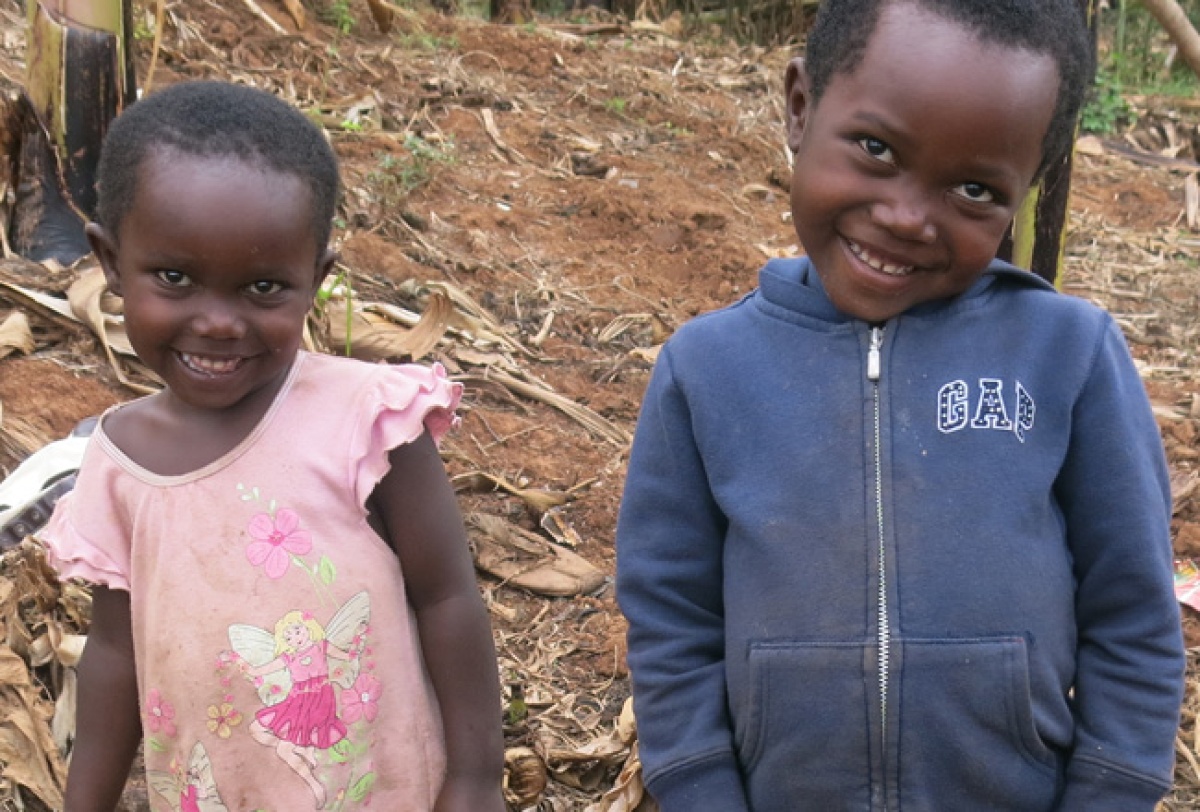In Rwanda, Food Security Efforts Treat Patients, Empower Families
Posted on Dec 10, 2013

When 3-year-old Adeline Uwera was brought to Rwinkwavu District Hospital three years ago, she was pencil thin with sunken eyes and an extended stomach. It was immediately apparent that she was suffering from protein-malnutrition, or kwashiorkor.
Through a partnership with the Rwinkwavu District Hospital, Partners In Health/Inshuti Mu Buzima (PIH/IMB) provided medical treatment and food supplements to aid in her recovery.
But PIH/IMB knows that giving malnourished patients food packages is simply not enough. In order to empower patients and keep them healthy, education and accompaniment are necessary. Through its Food Security and Livelihood Program, PIH/IMB equips families with the knowledge and tools needed to grow their own nutrient-rich foods and make healthy eating choices.
It was this program that transformed the lives of Adeline, now 6 years old and healthy, and her entire family.
“All my life, I had never known that some foods, especially vegetables and fruits, are high in nutrients and good for consumption. I have never been to school, so I didn’t know much about nutrition and the causes of malnutrition until my daughter suffered from kwashiorkor,” says Alphonsine Mukagaceri, Adeline’s mother.
In Rwanda, more than 40 percent of children under the age of 5 suffer from malnutrition or stunting, according to 2010 Rwandan Demographic and Health Survey. The Ministry of Health recently launched a 1,000-day campaign aimed at eradicating malnutrition. Because Rwanda is a landlocked country, improving agricultural practices is critical to achieving long-terms nutrition gains.
“The people from the PIH/IMB food security program taught me how to plant different vegetables and fruits such as carrots, greens, and passion fruit, among many others. They didn’t just teach me how to plant them, but they gave me seeds as well. They also sent people over to my place to follow up and teach me the proper techniques of growing fruits and vegetables in my kitchen garden,” Mukagaceri says.
Since its inception in 2008, the Food Security and Livelihood Program has enrolled more than 900 households.
Since its inception in 2008, the Food Security and Livelihood Program has enrolled more than 900 households throughout the PIH/IMB-supported districts, according to Vincent Nsabuwera, the program director. Nsabuwera noted that an additional 600 families were enrolled in the program this year.
As with all of PIH’s efforts in Rwanda, the Food Security and Livelihood Program was designed to work in coordination with similar government-led efforts. By working with families in the three districts PIH/IMB operates in to address nutrition issues, we’re helping bolster Rwanda’s National Multi-Sectorial Strategy to Eliminate Malnutrition.
Assisted families are given seeds that include iron- and zinc-fortified beans, cabbage, carrots, onions, avocado, mango trees, passion fruit, and moringa, among many others. They are also given fertilizer to boost production.
“Our program isn’t only to improve nutrition of the people, but it also aims at boosting the income of the targeted, vulnerable households as they plant not only for their consumption but for commercial purposes as well,” Nsabuwera said.
Our program isn’t only to improve nutrition of the people, but it also aims at boosting the income of the targeted, vulnerable households.
“Before, I didn’t own a garden and had no job, so I could hardly provide a decent meal for me and my children,” Mukagaceri says. “When I learned how to make my own garden, I started planting enough for my family to eat well. Additionally, I started to sell some of the food so that I could earn money to buy basic items and supplemental foods to balance our diets.”
Mukagaceri continues, “My daughter had suffered from kwashiorkor for one and a half years, and I thought this disease would claim her life. Today, she is a healthy and living testimony of how the kitchen garden is vital and something that every family should have… With the kitchen garden and all the skills that I now have, I believe that no one in my family will ever suffer from malnutrition again. My daughter is so healthy - she hardly falls sick. Every time I look at her, I am filled with joy.”
While Mukagaceri is a success story, there are many families that still need assistance and accompaniment. By the end of September 2013, Rwinkwavu District Hospital had registered more than 150 kids in need of supplementary feeding.
“We mostly received children less than 5 years of age. The most common malnutrition-related diseases seen are kwashiorkor and marasmus. We also received 46 cases of severe acute malnutrition between February and May of 2013,” said Immaculate Nyirandinda, the head of nutrition at Rwinkwavu District Hospital.
Nyirandinda added that most of the malnutrition cases are seen between October and January, when families are planting crops and waiting on yields.
By expanding the reach of the Food Security and Livelihood Program and enrolling more families, PIH/IMB is poised to help prevent future cases of malnutrition while simultaneously strengthening the local economy.
To learn more about PIH's efforts to treat malnutrition around the world, consider these stories:
Nourimanba: Fighting Malnutrition, Fighting Poverty in Haiti
Need to Know: MUAC and Malnutrition
World Food Day: A Q&A With PIH’s Haiti Nutrition Coordinator

